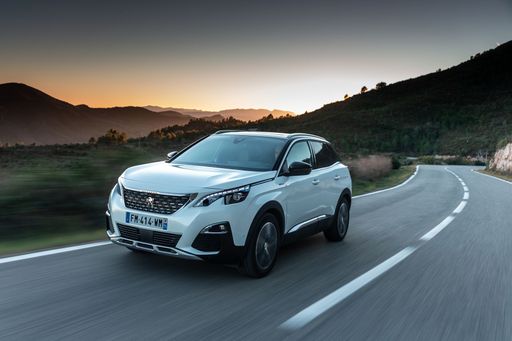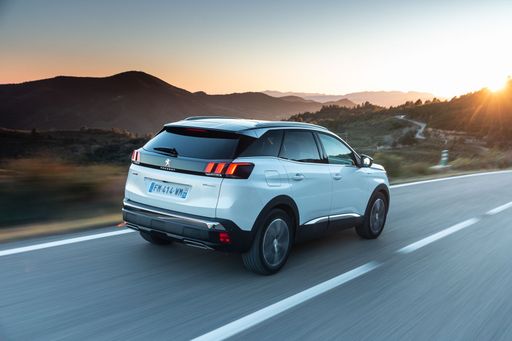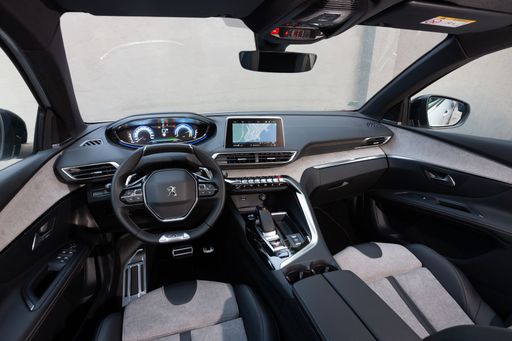Hyundai Bayon vs Peugeot 3008 – Performance, range & efficiency compared
Costs and Efficiency:
Price and efficiency are often the first things buyers look at. Here it becomes clear which model has the long-term edge – whether at the pump, the plug, or in purchase price.
Hyundai Bayon has a clearly advantage in terms of price – it starts at 20100 £, while the Peugeot 3008 costs 35100 £. That’s a price difference of around 15085 £.
Fuel consumption also shows a difference: Peugeot 3008 manages with 2.40 L and is therefore significantly more efficient than the Hyundai Bayon with 5.40 L. The difference is about 3 L per 100 km.
Engine and Performance:
Power, torque and acceleration are the classic benchmarks for car enthusiasts – and here, some clear differences start to show.
When it comes to engine power, the Peugeot 3008 has a convincingly edge – offering 325 HP compared to 100 HP. That’s roughly 225 HP more horsepower.
In acceleration from 0 to 100 km/h, the Peugeot 3008 is clearly quicker – completing the sprint in 6 s, while the Hyundai Bayon takes 11.30 s. That’s about 5.30 s faster.
In terms of top speed, the Peugeot 3008 performs slightly better – reaching 220 km/h, while the Hyundai Bayon tops out at 179 km/h. The difference is around 41 km/h.
There’s also a difference in torque: Peugeot 3008 pulls significantly stronger with 511 Nm compared to 200 Nm. That’s about 311 Nm difference.
Space and Everyday Use:
Beyond pure performance, interior space and usability matter most in daily life. This is where you see which car is more practical and versatile.
Both vehicles offer seating for 5 people.
In curb weight, Hyundai Bayon is significantly lighter – 1170 kg compared to 1648 kg. The difference is around 478 kg.
In terms of boot space, the Peugeot 3008 offers clearly perceptible more room – 520 L compared to 411 L. That’s a difference of about 109 L.
In maximum load capacity, the Peugeot 3008 performs slightly better – up to 1480 L, which is about 275 L more than the Hyundai Bayon.
When it comes to payload, Peugeot 3008 barely noticeable takes the win – 467 kg compared to 465 kg. That’s a difference of about 2 kg.
Who wins the race?
The Peugeot 3008 proves to be wins the duel decisively and therefore becomes our DriveDuel Champion!
Peugeot 3008 is the better all-rounder in this comparison.
Costs and Consumption
View detailed analysis
Engine and Performance
View detailed analysis
Dimensions and Body
View detailed analysis
 @ Peugeot / Stellantis Media
@ Peugeot / Stellantis Media
Peugeot 3008
Hyundai Bayon
The Hyundai Bayon slips neatly between city runabout and small SUV, offering surprising practicality and a fresh, confident design that stands out in urban traffic. It's an easy buy for shoppers who want smart packaging, tidy handling and a dash of personality without fuss — a sensible little crossover that makes everyday driving a bit more enjoyable.
details @ Hyundai Motor Company
@ Hyundai Motor Company
 @ Hyundai Motor Company
@ Hyundai Motor Company
 @ Hyundai Motor Company
@ Hyundai Motor Company
 @ Hyundai Motor Company
@ Hyundai Motor Company
 @ Hyundai Motor Company
@ Hyundai Motor Company
Peugeot 3008
The Peugeot 3008 blends bold French styling with a surprisingly grown-up interior that makes even dull commutes feel a little bit special. Practical enough for family life yet lively to drive, it’s a clever all‑rounder that stands out from the crossover crowd without shouting for attention.
details @ Peugeot / Stellantis Media
@ Peugeot / Stellantis Media
 @ Peugeot / Stellantis Media
@ Peugeot / Stellantis Media
 @ Peugeot / Stellantis Media
@ Peugeot / Stellantis Media
 @ Peugeot / Stellantis Media
@ Peugeot / Stellantis Media
 @ Hyundai Motor Company
@ Hyundai Motor Company
|
 @ Peugeot / Stellantis Media
@ Peugeot / Stellantis Media
|
|
|
|
Costs and Consumption |
|
|---|---|
|
Price
20100 - 25800 £
|
Price
35100 - 52000 £
|
|
Consumption L/100km
5.4 - 5.5 L
|
Consumption L/100km
2.4 - 5.4 L
|
|
Consumption kWh/100km
-
|
Consumption kWh/100km
16.9 - 17.6 kWh
|
|
Electric Range
-
|
Electric Range
81 - 698 km
|
|
Battery Capacity
-
|
Battery Capacity
0.4 - 96.9 kWh
|
|
co2
124 g/km
|
co2
0 - 121 g/km
|
|
Fuel tank capacity
40 L
|
Fuel tank capacity
55 L
|
Dimensions and Body |
|
|---|---|
|
Body Type
SUV
|
Body Type
SUV
|
|
Seats
5
|
Seats
5
|
|
Doors
5
|
Doors
5
|
|
Curb weight
1170 - 1195 kg
|
Curb weight
1648 - 2266 kg
|
|
Trunk capacity
411 L
|
Trunk capacity
470 - 520 L
|
|
Length
4180 mm
|
Length
4542 mm
|
|
Width
1775 mm
|
Width
1895 mm
|
|
Height
1500 mm
|
Height
1641 mm
|
|
Max trunk capacity
1205 L
|
Max trunk capacity
1430 - 1480 L
|
|
Payload
460 - 465 kg
|
Payload
432 - 467 kg
|
Engine and Performance |
|
|---|---|
|
Engine Type
Petrol
|
Engine Type
Electric, Petrol MHEV, Plugin Hybrid
|
|
Transmission
Manuel, Automatic
|
Transmission
Automatic
|
|
Transmission Detail
Manual Gearbox, Dual-Clutch Automatic
|
Transmission Detail
Reduction Gearbox, Dual-Clutch Automatic
|
|
Drive Type
Front-Wheel Drive
|
Drive Type
Front-Wheel Drive, All-Wheel Drive
|
|
Power HP
100 HP
|
Power HP
145 - 325 HP
|
|
Acceleration 0-100km/h
11.3 - 12.4 s
|
Acceleration 0-100km/h
6 - 10.2 s
|
|
Max Speed
176 - 179 km/h
|
Max Speed
170 - 220 km/h
|
|
Torque
172 - 200 Nm
|
Torque
230 - 511 Nm
|
|
Number of Cylinders
3
|
Number of Cylinders
3 - 4
|
|
Power kW
74 kW
|
Power kW
107 - 239 kW
|
|
Engine capacity
998 cm3
|
Engine capacity
1199 - 1598 cm3
|
General |
|
|---|---|
|
Model Year
2024
|
Model Year
2024 - 2025
|
|
CO2 Efficiency Class
D
|
CO2 Efficiency Class
A, D, B
|
|
Brand
Hyundai
|
Brand
Peugeot
|
What drivetrain options does the Hyundai Bayon have?
The Hyundai Bayon is available as Front-Wheel Drive.
The prices and data displayed are estimates based on German list prices and may vary by country. This information is not legally binding.
